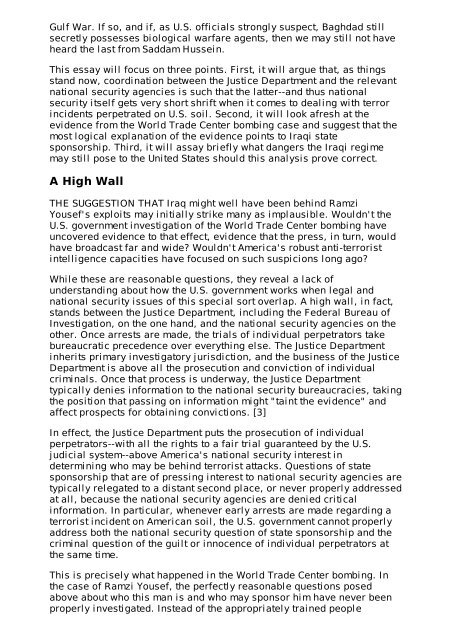linked - Investigating the Terror
linked - Investigating the Terror
linked - Investigating the Terror
Create successful ePaper yourself
Turn your PDF publications into a flip-book with our unique Google optimized e-Paper software.
Gulf War. If so, and if, as U.S. officials strongly suspect, Baghdad still<br />
secretly possesses biological warfare agents, <strong>the</strong>n we may still not have<br />
heard <strong>the</strong> last from Saddam Hussein.<br />
This essay will focus on three points. First, it will argue that, as things<br />
stand now, coordination between <strong>the</strong> Justice Department and <strong>the</strong> relevant<br />
national security agencies is such that <strong>the</strong> latter--and thus national<br />
security itself gets very short shrift when it comes to dealing with terror<br />
incidents perpetrated on U.S. soil. Second, it will look afresh at <strong>the</strong><br />
evidence from <strong>the</strong> World Trade Center bombing case and suggest that <strong>the</strong><br />
most logical explanation of <strong>the</strong> evidence points to Iraqi state<br />
sponsorship. Third, it will assay briefly what dangers <strong>the</strong> Iraqi regime<br />
may still pose to <strong>the</strong> United States should this analysis prove correct.<br />
A High Wall<br />
THE SUGGESTION THAT Iraq might well have been behind Ramzi<br />
Yousef's exploits may initially strike many as implausible. Wouldn't <strong>the</strong><br />
U.S. government investigation of <strong>the</strong> World Trade Center bombing have<br />
uncovered evidence to that effect, evidence that <strong>the</strong> press, in turn, would<br />
have broadcast far and wide? Wouldn't America's robust anti-terrorist<br />
intelligence capacities have focused on such suspicions long ago?<br />
While <strong>the</strong>se are reasonable questions, <strong>the</strong>y reveal a lack of<br />
understanding about how <strong>the</strong> U.S. government works when legal and<br />
national security issues of this special sort overlap. A high wall, in fact,<br />
stands between <strong>the</strong> Justice Department, including <strong>the</strong> Federal Bureau of<br />
Investigation, on <strong>the</strong> one hand, and <strong>the</strong> national security agencies on <strong>the</strong><br />
o<strong>the</strong>r. Once arrests are made, <strong>the</strong> trials of individual perpetrators take<br />
bureaucratic precedence over everything else. The Justice Department<br />
inherits primary investigatory jurisdiction, and <strong>the</strong> business of <strong>the</strong> Justice<br />
Department is above all <strong>the</strong> prosecution and conviction of individual<br />
criminals. Once that process is underway, <strong>the</strong> Justice Department<br />
typically denies information to <strong>the</strong> national security bureaucracies, taking<br />
<strong>the</strong> position that passing on information might "taint <strong>the</strong> evidence" and<br />
affect prospects for obtaining convictions. [3]<br />
In effect, <strong>the</strong> Justice Department puts <strong>the</strong> prosecution of individual<br />
perpetrators--with all <strong>the</strong> rights to a fair trial guaranteed by <strong>the</strong> U.S.<br />
judicial system--above America's national security interest in<br />
determining who may be behind terrorist attacks. Questions of state<br />
sponsorship that are of pressing interest to national security agencies are<br />
typically relegated to a distant second place, or never properly addressed<br />
at all, because <strong>the</strong> national security agencies are denied critical<br />
information. In particular, whenever early arrests are made regarding a<br />
terrorist incident on American soil, <strong>the</strong> U.S. government cannot properly<br />
address both <strong>the</strong> national security question of state sponsorship and <strong>the</strong><br />
criminal question of <strong>the</strong> guilt or innocence of individual perpetrators at<br />
<strong>the</strong> same time.<br />
This is precisely what happened in <strong>the</strong> World Trade Center bombing. In<br />
<strong>the</strong> case of Ramzi Yousef, <strong>the</strong> perfectly reasonable questions posed<br />
above about who this man is and who may sponsor him have never been<br />
properly investigated. Instead of <strong>the</strong> appropriately trained people


